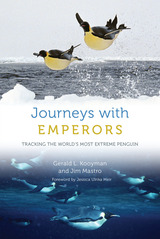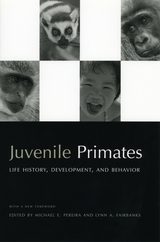137 books about Behavior and 2
start with J
137 books about Behavior and 2
137 books about Behavior
2 start with J start with J
2 start with J start with J

Journeys with Emperors
Tracking the World's Most Extreme Penguin
Gerald L. Kooyman and Jim Mastro
University of Chicago Press, 2023
With stunning photographs from the ice edge, a firsthand account of a researcher’s time in Antarctica and of the perilous journeys of the world’s largest penguin species: the iconic emperor.
Nearly all emperor penguin colonies are extremely remote; of the sixty-six known, fewer than thirty have been visited by humans, and even fewer have been the subject of successful research programs. One of the largest known emperor penguin colonies is found on a narrow band of sea ice attached to the Antarctic continent. In Journeys with Emperors, Gerald L. Kooyman and Jim Mastro take us to this far-flung colony in the Ross Sea, showing us how scientists gained access to it, and what they learned while living among the penguins as they raised their chicks.
The primary mission was to record the birds’ activities at sea, and the data revealed important aspects of emperor penguin behavior and physiology: for instance, that in the course of hunting for food, some of the penguins dive to depths of greater than five hundred meters (a third of a mile, which is deeper than for any other diving bird). The researchers also discovered that, crucially, most of the emperor’s life is actually spent at sea, with fledged chicks and adults making separate, perilous journeys through icy water. When chick nurturing is complete, the fledglings abandon the colony in large groups, heading north to the Southern Ocean. The adults leave at the same time, traveling one thousand kilometers eastward across the Ross Sea to a sea-ice sanctuary for molting. During this journey, they must gain enough weight to survive the month-long molt, when every feather is replaced and the birds cannot enter the water to feed. After the molt, many if not most return to the colony to breed once again. For the males, this means another fast—this time for 120 days as they incubate their eggs. The nearness of the colony to the ice edge spared the penguins the long, energy-draining march for which other colonies are well-known. It also allowed researchers to observe the penguins’ departures to and arrivals from their foraging journeys, as well as their dangerous interactions with leopard seals and killer whales.
Featuring original color photographs and complemented with online videos, Journeys with Emperors is both an eye-opening overview of the emperor penguin’s life and a thrilling tale of scientific discovery in one of the most remote, harsh, and beautiful places on Earth.
The primary mission was to record the birds’ activities at sea, and the data revealed important aspects of emperor penguin behavior and physiology: for instance, that in the course of hunting for food, some of the penguins dive to depths of greater than five hundred meters (a third of a mile, which is deeper than for any other diving bird). The researchers also discovered that, crucially, most of the emperor’s life is actually spent at sea, with fledged chicks and adults making separate, perilous journeys through icy water. When chick nurturing is complete, the fledglings abandon the colony in large groups, heading north to the Southern Ocean. The adults leave at the same time, traveling one thousand kilometers eastward across the Ross Sea to a sea-ice sanctuary for molting. During this journey, they must gain enough weight to survive the month-long molt, when every feather is replaced and the birds cannot enter the water to feed. After the molt, many if not most return to the colony to breed once again. For the males, this means another fast—this time for 120 days as they incubate their eggs. The nearness of the colony to the ice edge spared the penguins the long, energy-draining march for which other colonies are well-known. It also allowed researchers to observe the penguins’ departures to and arrivals from their foraging journeys, as well as their dangerous interactions with leopard seals and killer whales.
Featuring original color photographs and complemented with online videos, Journeys with Emperors is both an eye-opening overview of the emperor penguin’s life and a thrilling tale of scientific discovery in one of the most remote, harsh, and beautiful places on Earth.
[more]

Juvenile Primates
Life History, Development and Behavior, with a new Foreword
Edited by Michael E. Pereira and Lynn A. Fairbanks
University of Chicago Press, 2003
The first and still the only book focused exclusively on juvenile primates, this collection presents original research covering all the major divisions of primates, from prosimians to humans. Contributors explore the evolutionary history of the juvenile stage in primates, differences in behavior between juvenile males and females, how juvenile behaviors act both to prepare juveniles for adulthood and to help them survive the juvenile stage, how juveniles learn about and participate in social conflict and dominance relationships, and the similarities and differences between development of juvenile human and nonhuman primates. This edition includes a new foreword and bibliography prepared by the editors.
Contributors:
Filippo Aureli, Bernard Chapais, Marina Cords, Carolyn M. Crockett, Frans B. M. de Waal, Carolyn Pope Edwards, Robert Fagen, Carole Gauthier, Paul H. Harvey, Charlotte K. Hemelrijk, Loek A. M. Herremans, Julia A. Horrocks, Wayne Hunte, Charles H. Janson, Nicholas Blurton Jones, Katharine Milton, Leanne T. Nash, Timothy G. O'Brien, Mark D. Pagel, Theresa R. Pope, Anne E. Pusey, Lal Singh Rajpurohit, John G. Robinson, Thelma Rowell, Daniel I. Rubenstein, Volker Sommer, Elisabeth H. M. Sterck, Karen B. Strier, Carel P. van Schaik, Maria A. van Noordwijk, David P. Watts, and Carol M. Worthman.
Contributors:
Filippo Aureli, Bernard Chapais, Marina Cords, Carolyn M. Crockett, Frans B. M. de Waal, Carolyn Pope Edwards, Robert Fagen, Carole Gauthier, Paul H. Harvey, Charlotte K. Hemelrijk, Loek A. M. Herremans, Julia A. Horrocks, Wayne Hunte, Charles H. Janson, Nicholas Blurton Jones, Katharine Milton, Leanne T. Nash, Timothy G. O'Brien, Mark D. Pagel, Theresa R. Pope, Anne E. Pusey, Lal Singh Rajpurohit, John G. Robinson, Thelma Rowell, Daniel I. Rubenstein, Volker Sommer, Elisabeth H. M. Sterck, Karen B. Strier, Carel P. van Schaik, Maria A. van Noordwijk, David P. Watts, and Carol M. Worthman.
[more]
READERS
Browse our collection.
PUBLISHERS
See BiblioVault's publisher services.
STUDENT SERVICES
Files for college accessibility offices.
UChicago Accessibility Resources
home | accessibility | search | about | contact us
BiblioVault ® 2001 - 2024
The University of Chicago Press









